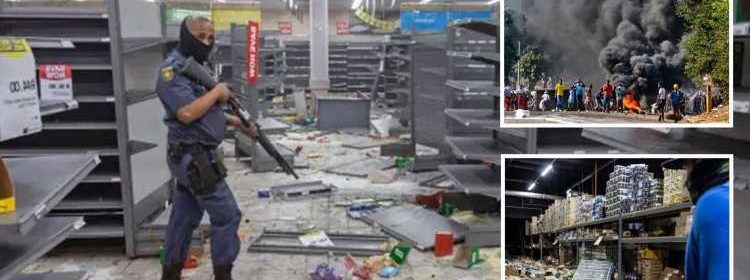South Africa riots – Starving rioters say they are 'on verge of eating each other' after violence sparks food shortages

STARVING rioters in South Africa have said they are on the verge of "eating each other" as days of looting and violence sparks severe food shortages.
Chaotic protests have erupted across the country after former president Jacob Zuma was handed a 15-month jail term last week for failing to appear at a corruption inquiry.
At least 75 people have died and more than 1,200 arrested as the country's consumer goods body estimated more than 800 shops had been ransacked.
Many of the deaths were caused by stampedes as thousands of people raided shops, stealing food, electrical appliances, alcohol and clothes, cops said.
Shocking images showed hundreds of people running towards a warehouse on Wednesday and tearing through containers as the violence battered the country for a sixth day.
The looting has hit supply chains and transport links in the southeastern province of KwaZulu-Natal, impacting goods and services around the country.
'PREPARED TO DIE'
As disruption to farming, manufacturing and oil refining sparks fears of food and fuel shortages, community leader Nhlanhla Lux, 33, told the Financial Times: "We are on the verge of eating each other."
Dressed in camouflage and armed with a gun outside a shopping centre in Johannesburg's Soweto township, he said he is "prepared to die" to halt the chaos.
"We can’t sit back while the township economy dilapidates further," he said.
"The biggest mall, that employs the biggest number of people, is the one left standing. If it falls, it’s the last elephant."
Bread was being sold from a delivery truck outside the shopping mall as stores have either been looted or shut due to fears of vandalism.
President Cyril Ramaphosa has warned parts of the country "may soon be running short of basic provisions following the extensive disruption of food, fuel and medicine supply chains".
"It is a war zone… towns deserted, shops looted, bodies lying on the road"
The government is set to deploy 25,000 troops to curb the unrest.
State-owned logistics operator Transnet declared a "force majeure" yesterday – an emergency beyond its control – on a key rail line that links Johannesburg to the coast due to the unrest.
Earlier this week, the country's largest refinery SAPREF shut its plant in Durban, which is responsible for a third of South Africa's fuel supply.
"It's inevitable that we will have fuel shortages in the next couple of days or weeks," the Automobile Association's Layton Beard said.
Christo van der Rheede, executive director of the largest farmers' organisation, AgriSA, said producers were struggling to get crops to market due to the logistical "shambles".
He warned if law and order were not restored soon, "we are going to have a massive humanitarian crisis".
VIGILANTE GROUPS
Sugarcane fields were torched in KwaZulu-Natal, the main cane-growing region, while cattle were stolen elsewhere.
"It is a war zone… towns deserted, shops looted, bodies lying on the road," John Steenhuisen, leader of the main opposition Democratic Alliance in the province, told the Financial Times.
Locals have started forming vigilante groups to protect shops and buildings in their neighbourhoods.
A group of minibus operators armed themselves with sticks and firearms yesterday and violently beat up suspected looters in Vosloorus township, southeastern Johannesburg.
The government has been under mounting pressure to increase boots on the ground to quickly put a lid on the violence battering an already struggling economy.
Most read in News
BITTER CHILL Snow to BATTER Britain 'within weeks' says Met Office as temps to DROP further
New evidence about chief Maddie suspect leaves investigators 'shocked'
PM held indoor birthday bash at height of lockdown in fresh partygate
Tributes to 'absolutely amazing' lad, four, killed in off-road bike crash
Defence Minister Nosiviwe Mapisa-Nqakula told parliament she "submitted a request for deployment of plus-minus 25,000" soldiers as troop deployments must be authorised by the president.
The violence has also disrupted the Covid vaccine rollout and medicines deliveries to hospitals.
The country, which has recorded more than 2.2 million infections, is in the middle of a brutal virus third wave.
Source: Read Full Article









